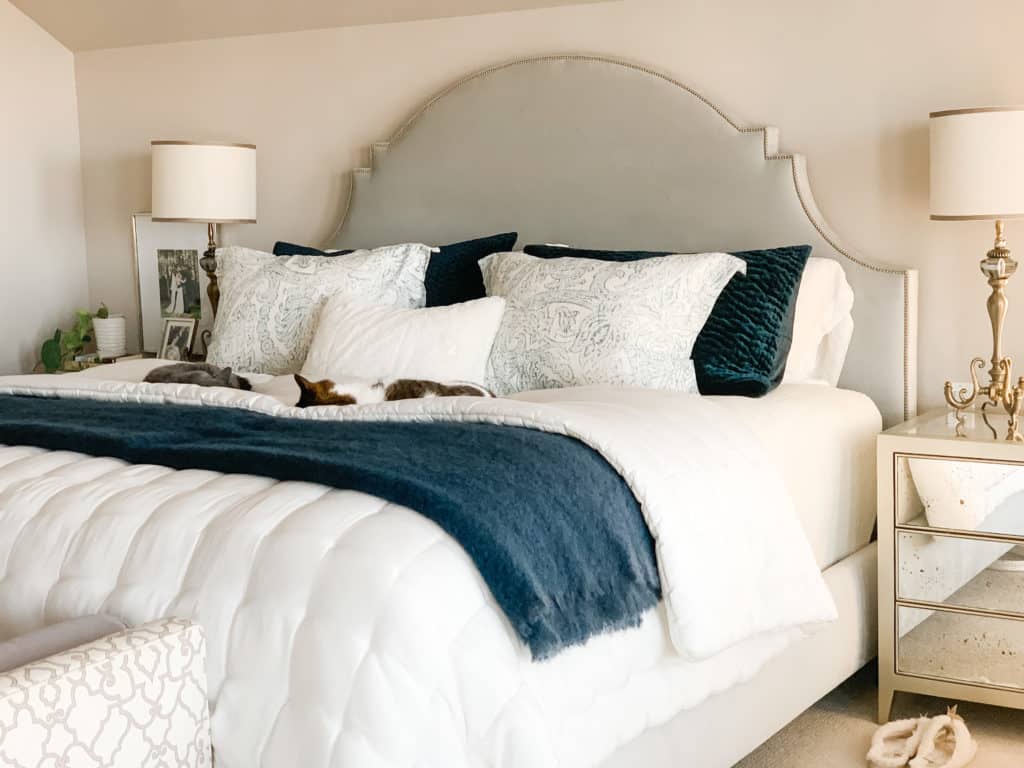
How are you all doing?
I meant to post this during National Sleep Week last week, but then the world fell into the surreal twilight zone of social distancing and daily life took on a different rhythm. As we all settle into our new normal, anxiety is high and the need to connect is greater than ever. Also, the need for sleep.
If you tend to have trouble sleeping, times of high stress can make it worse. I hope these tips help. Stay well.
This post will not help you if you have a certain adorable four-year-old who crawls in your bed every morning at 4 a.m. and twirls your hair for an hour before finally going back to sleep. Or--like this morning--talks and giggles until you finally just forget about going back to sleep and get up. But, if small children are not the source of your sleeplessness, this post might help.
I have been a terrible sleeper my whole life. As a little girl, I used to lay awake in bed for what felt like hours, trying to count sheep or recite stories to help myself drift off to sleep. My mom would often come help me practice relaxation exercises to coax my body to sleep. I appreciated her effort, but it rarely worked.
As an adult, I just got used to it, that feeling of starting the morning still tired from tossing and turning and waking repeatedly all night long. Of being so tired mid-afternoon but resisting naps, because that would only make my nighttime sleep worse. Ironically, the best sleep of my life came right after Theo was born, when postpartum hormones kicked in and I could fall asleep quickly and sleep deeply whenever Theo was sleeping. I’d never experienced that ability to sleep before, and it felt heavenly.
At the beginning of last year, when I set my new year’s intentions, I decided that was the year to focus on sleep. I became desperate to find a solution so I would have the energy and patience to play with Theo every day. It’s harder to be patient when you’re so tired. I had dabbled in sleep hygiene before—trying to stay off devices or taking CALM (magnesium citrate) before bed. But nothing consistently worked. My yearly reflection and goal-setting exercise brought this intention into focus.
I started researching sleep, listening to podcasts and reading books on the science of sleep. And I started experimenting with some of the tools and techniques I discovered. At the beginning of the year, I might be in bed for eight hours, but I was only getting five or six hours of sleep. My sleep would be restless, with frequent wakings and less than 30 minutes of deep sleep. I never felt rested. At the end of this year, I still try to be in bed for at least eight hours, and on most nights—but not all—I don’t toss and turn or have memories of waking in the night. I get around an hour of deep sleep and two to three hours of REM. My sleep’s not perfect--especially when Theo sleeps with us--but it’s markedly better.
When I started on my journey to better sleep, I wanted to be able to track what I was doing and see what actually made a difference in the number of hours I slept, my deep sleep and REM. There are many sleep trackers on the market, but the Oura Ring felt like the easiest to use and seemed to provide the most reliable data. I started wearing the ring and tracking my sleep and any sleep interventions so I could determine what worked and what didn’t. Here are the tools and techniques I discovered to help me start sleeping better.
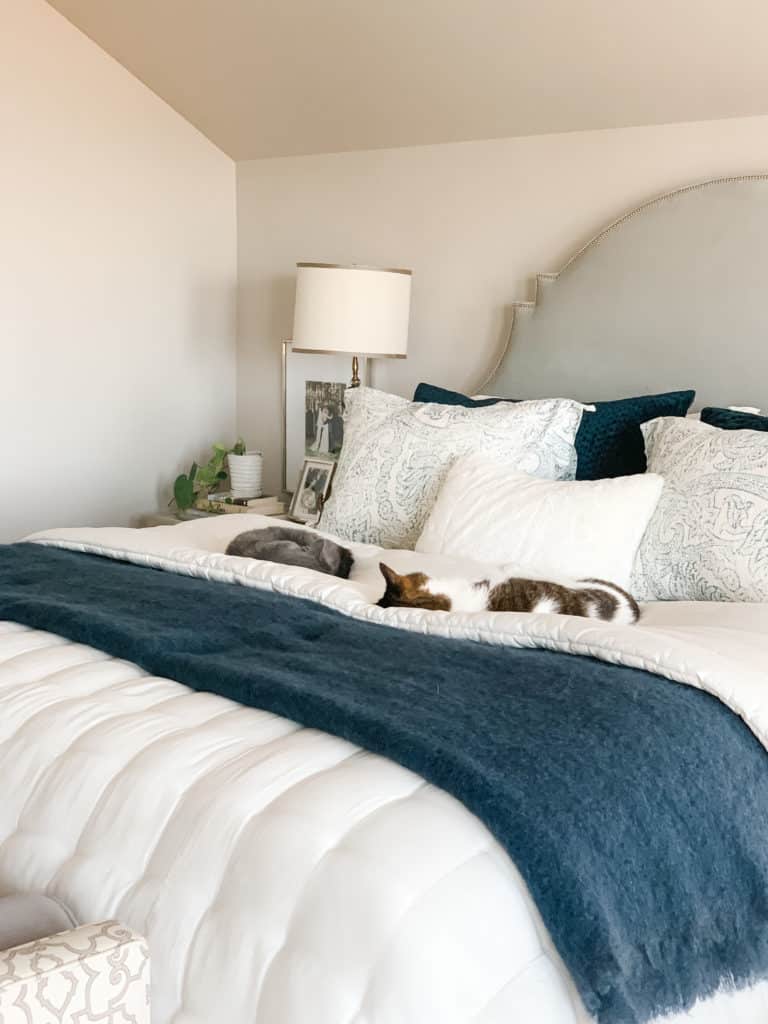
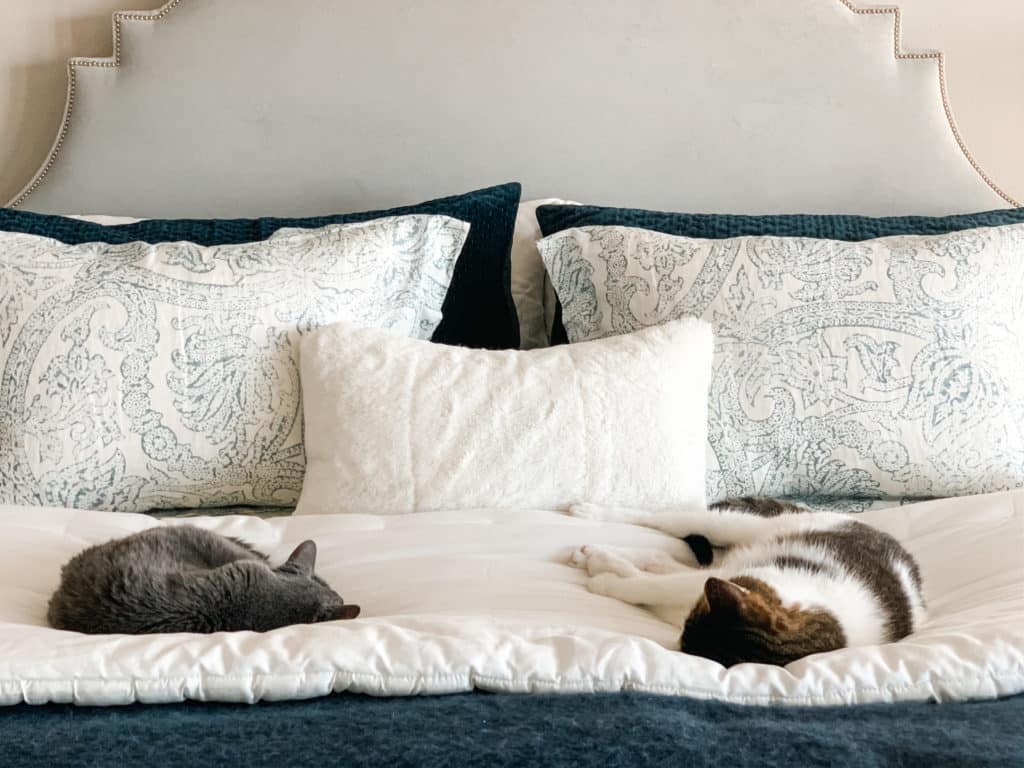
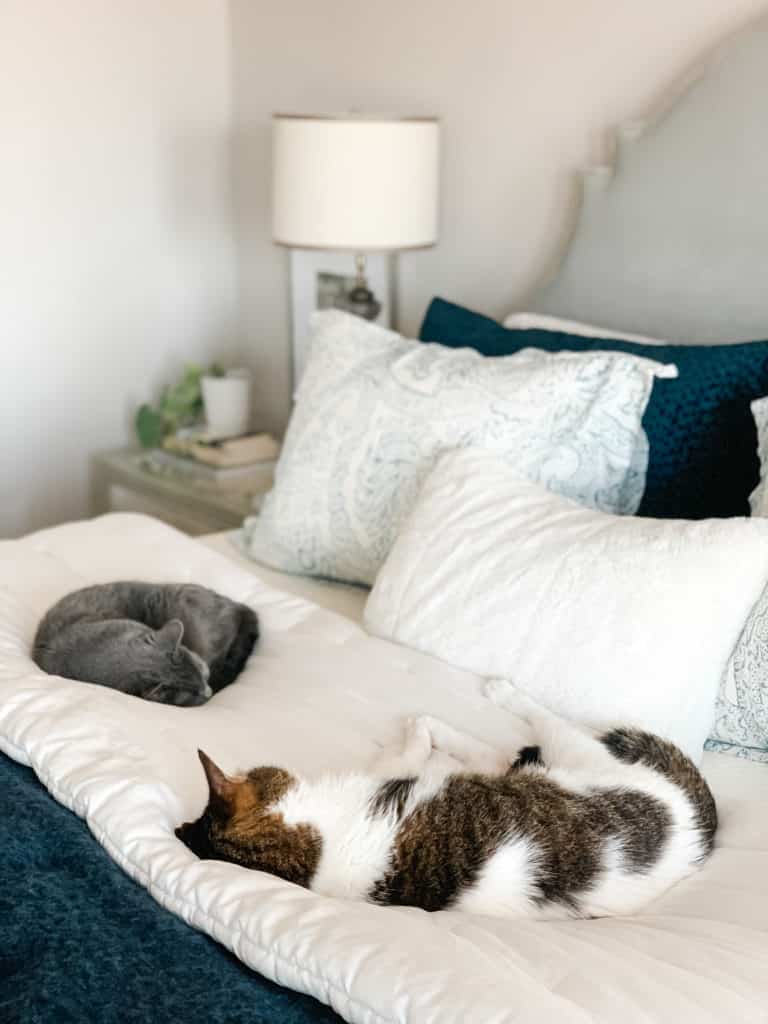
You’ve probably heard of weighted blankets, since they are very trendy right now. Early research on weighted blankets shows they can help calm anxiety and reduce nighttime cortisol release (which can cause early waking). The weight of the blanket helps to calm your nervous system and--for me--almost completely stopped my tossing and turning, significantly reducing the number of times I woke at night. I started off with this napper, just to make sure I liked it, and then Elie and I switched to this duvet on our bed. Even Elie, who doesn’t have any problems sleeping, likes sleeping under the weighted blanket. It is so calming and soothing, it feels like I imagine a baby feels when he’s swaddled. The napper now lives in our living room, a cozy blanket for movie nights, and we use the duvet on our bed. The one thing to note about the duvet--it only covers the top of the bed, so if you're particular about how your bed looks, you'll want to cover it with a coverlet or blanket.
A drop in body temperature as you’re drifting off to sleep helps your body to enter deep sleep, that deeply restorative part of sleep when your body doesn’t move or dream. Deep sleep generally occurs only in the first half of the night, so if your sleep is disrupted in the first few hours after going to sleep (hello, parents of little children), achieving good deep sleep is less likely. You’re also less likely to get deep sleep if you’re hot.
I used to get only about 15 minutes of deep sleep each night until I purchased the ChiliPAD, a mattress pad that circulates cold water to help regulate your body temperature in the night. I have found that if I set mine to 67 degrees, it drops my body temperature, but I don’t wake up cold in the night. And I stay warm under the weighted blanket. Now, I often get an hour or more of deep sleep, which is the minimum amount of deep sleep required for restorative sleep.
The ChiliPAD is expensive, so it won’t be a good choice for everyone. You can achieve a similar result by taking a hot shower or bath before bed, because your core body temperature will drop as you’re drifting off to sleep. You can also set your bedroom temperature to 65 degrees, if you have that ability, since sleeping in a cold room will also support deep sleep.
There are many nutrition-support sleep aids on the market, and I’ve experimented with many of them. You may have seen CALM on the market, which is marketed to help you get better sleep. CALM contains magnesium citrate, which is poorly absorbed into the blood stream. It will help you with bowel movements more than sleep. Magnesium glycinate is the best absorbed form of magnesium. Many people are deficient in magnesium, so taking magnesium glycinate will help with neurological function and help you achieve more deep sleep. I take 400 – 800 mg of magnesium glycinate an hour before bed, but check with your doctor for the dose that is right for you. I like this brand of magnesium.
If you read or listen to podcasts in the wellness space, you’ve probably heard of mushrooms, ones like reishi or lion’s mane or cordyceps to help with everything from concentration and memory to energy. Research shows reishi mushrooms help with deep, restorative sleep. I started taking 1 teaspoon of this tea in hot water before bed, and I notice a marked difference in my sleep when I take it versus not. It’s bitter, sort of like black coffee, but I’ve come to really enjoy a cup before bedtime.
In general, I don’t have a hard time falling asleep, just staying asleep. But I went through a period where I couldn’t fall asleep, or would wake up after only an hour or two of sleep. I couldn’t figure it out, until one day, Elie pointed out the small piece of dark chocolate I always ate after dinner. Elie looked it up, and that piece of chocolate contained a significant amount of caffeine, almost equivalent to a cup of coffee. I cut out the chocolate and no longer had any problems with sleep at the beginning of the night. I do miss my chocolate, though.
While a glass of wine at dinner probably won't interrupt your sleep, the glass of wine after dinner might. Drinking alcohol before bed can make it easy to go to sleep, but it can also suppress REM sleep and cause more restlessness and wakings later in the night. I definitely notice I don't sleep as well after a fun late-night dinner party.
By now, we all know blue light disrupts our sleep, so we should be staying off our devices at least an hour or so before bed. But I find that what also disrupts my sleep is the type of material I’m viewing or reading. A traumatic movie. Instagram posts or stories that prompt a negative script in my bed. Novels or memoirs that evoke memories of trauma. I try to avoid all of those before bed, because as soon as I turn out the light, my mind will start spinning, reliving old stories or inciting a barrage of self-doubt. I leave that kind of reading to poolside, or not at all.
Side note: I haven’t tried any of the blue light blocking glasses, but if you have problems falling asleep, you might want to give these a try.
When I’m traveling, I never sleep well. I attribute it less to not having my home sleep aids than to the numerous blue lights or lack of blackout shades in hotel rooms and Airbnbs. Sometimes, I will try to cover them with shirts or towels, but often it’s also the fire escape signs above the door or the street lights streaming through the seams in the curtains. I’ve tried wearing an eye mask, but I find them annoying and end up taking it off halfway through the night. So at least at home, our room is as dark as we can possibly make it, which helps reduce waking at night and also helps in sleeping past sunrise in the summer (when Theo allows it).
Try Meditation or Breathwork
Both meditation and breathwork have been shown to help with sleep, both to lower your heart rate and clear your mind to prepare your body for rest. I have found it hard to incorporate a regular mediation practice right before bed, but it may be helpful to you. Personally, I've found breathwork to be easier to incorporate into my life. If I wake in the night and have a hard time falling back asleep, I'll use breathwork techniques to focus on my body and relax my mind. I’ve used both the Headspace and Ten Percent Happier apps to help learn mediation and breathwork techniques. I'm also starting a breathwork practice here, and she has some free support groups starting right now. This episode on the Ten Percent Happier podcast also has helpful information on sleep.
I experimented with both lion’s mane tea and reishi tea for sleep. For me, the reishi works better for sleep, but I know other people have good luck with lion’s mane. Try both to see which one works for you.
I tried a CBD tincture, and I didn’t really feel like it helped me get better sleep. But I already have so many different variables in play, maybe I just couldn’t tell. If you want to try CBD for sleep, this is a great company (and their CBD lotion is amazing for soothing sore muscles and getting rid of tummy aches--it really works).
As I’ve said, I don’t have any problems going to sleep, so I don’t need a sleep aid for that. But if you do, small doses of melatonin may help. Just be sure to familiarize yourself on the research, as some studies show that regularly taking melatonin will reduce your body’s natural production of the sleep hormone. We do take melatonin when we’re traveling through significant time changes, and it does help to adjust circadian rhythms.
If the magnesium glycinate alone doesn’t work for you, try adding GABA, and/or about 200 mg of l-Theonine with it. Sometimes that combination will work better than magnesium glycinate alone. GABA can be especially helpful with calming the mind during times of stress.
Theo has slept with a white noise machine since he was little, to drown out outside noise that might disrupt his sleep. While Elie and I don’t sleep with white noise in our room at home, we do when we travel. Hotel rooms can be noisy with slamming doors or people talking in the hall, or traffic outside. If outside noise regularly wakes you at night, you might try a white noise machine. We like this one for home and this one for travel.
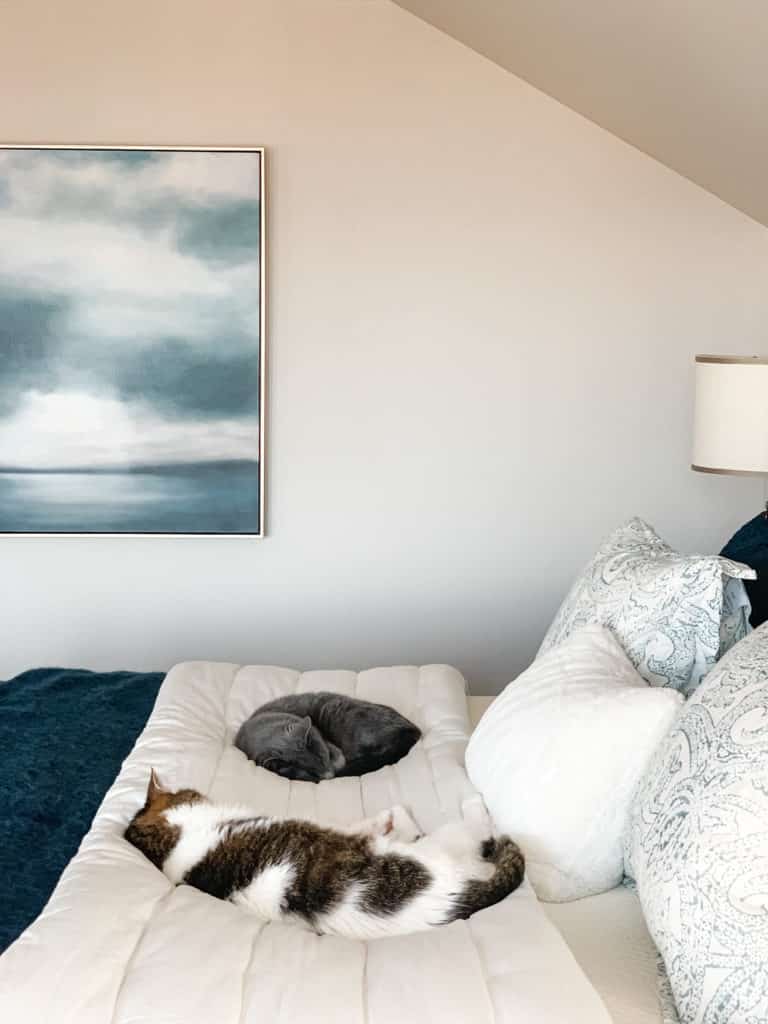
It took me almost an entire year of trial and error to find out the sleep aids and routines that helped me sleep better. What works for me may or may not work for you, because we’re all different. We have different genes, stressors, partners, home lives and routines that impact our sleep. What I really want from this post, aside from the practical information, is to give you hope. Hope to make a full, restful night’s sleep a normal part of your life.
I had been such a ‘bad sleeper’ for so long, I wasn’t sure it would change. And to be honest, I still have weeks where I don’t get good sleep. But now it’s usually because something’s going on—Theo’s sick or I have something on my mind or we’re travelling. But if I’m home and committed to my nighttime routine, I can now sleep eight hours with two hours of REM sleep and an hour or more of deep sleep. And that feels amazing.
If I can do it, you can do it. Sending you all hugs during this time.
I love when I see an email from a friend, and that’s how I think of you. I hope you feel the same. In my newsletter, I share the kinds of recipes and stories I used to blog about. You’ll get the recipes I’m cooking for my family as well as anything else I think might bring more connection or more joy.